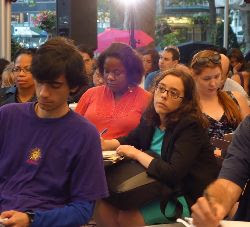
Yeah, so I found myself in Lake Charles, Louisiana about two weeks ago. Long story why, won’t go into that here. It’s not the most exciting town around, but they do have some good gumbo, like the bowl I ate (shown in pic) from KD’s Diner.
You don’t fall asleep while you’re eating gumbo. It’s alive with an intricate blend of taste sensations that’s a bit different wherever you go. There’s a kick, yes, but also a darkness (from the roux) that seems like it’s coming from somewhere deep underground.
We should make the most of our senses because it makes our lives spicier, and this goes double for the writers in the room, who are responsible for stirring the world around us into a soup of words.
Here’s Fred Plotkin, author of books on opera and Italian cuisine:
Most humans have been given the remarkable gift of five senses, but few use them to their fullest potential. I try to activate all of them all the time and, in so doing, make myself open to sensations and memories most people miss. I listen rather than hear. I savor rather than eat or smell. I look rather than see. I feel rather than touch.
You can translate sensory experience in a simple manner, like this line from Rick Rojas’s NY Times article about the recent heat in Louisiana:
Cool air swirled through the devil-red metal box of a building.
Or you can get fancier with it, like this night-sky description from James Joyce’s novel Ulysses:
The heaventree of stars hung with humid nightblue fruit.
Sight is key, but cook with the other four senses as well, even blending them. My colleague Kelly Caldwell wrote about the sense of touch here.
Check out this from Elizabeth McCracken’s short story “It’s Not You”:
The Bloody Mary had some spice in it that sent a tickle through my palate into my nose. A prickle, a yearning, an itch: a gathering sneezish sensation.
Aren’t you feeling that?
And check out this from Tommy Orange’s novel There There:
I watch my shadow grow long then flatten on the highway as a car flies by without slowing or seeming to notice me. Not that I want slowing or notice. I kick a rock and hear it ding against a can or some hollow thing in the grass. I pick up my pace and as I do a hot gust of air and the smell of gas blow by with the passing of a big truck.
When you read this, you’re standing on that highway right beside this character. What did you experience, sensorially, today or yesterday? Write it up.

Alex Steele,
Gotham President






